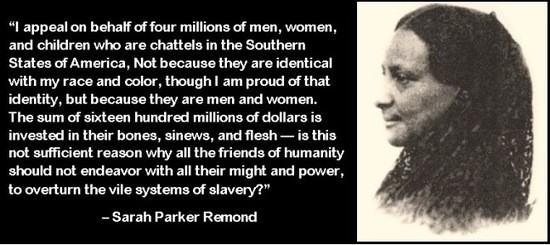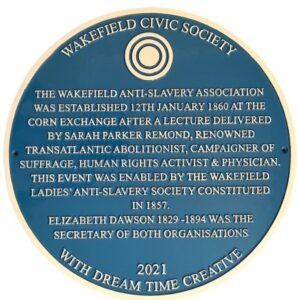March 8th: Today’s Feature
- webbworks333
- Mar 8, 2025
- 6 min read
March
Part II: Sarah Parker Remond
Anti-slavery Lecturing in Great Britain
As a good speaker and fundraiser, Remond was invited to take the cause of the American abolitionists to Britain, as her brother Charles had done 10 years earlier. Accompanied by the Reverend Samuel May Jr., she sailed from Boston for Liverpool on December 28, 1858, on the steamer Arahia. They arrived in Liverpool on January 12, 1859, after a discomforting trip in the winter. The ship had become covered with ice and snow, and rolled and tossed so much that many of the passengers became ill, including Remond.

At Tuckerman Institute on January 21, 1859, Remond gave her first antislavery lecture in England. Her second lecture, "Slave Life in America," took place just a few days later on January 24. During these speeches, she spoke eloquently of the inhumane treatment of slaves in the United States, her stories shocking many of her listeners. She also described the discrimination endured by free blacks throughout the United States.
For the next three years, Remond lectured to crowds in several other towns and cities throughout the British Isles (including Warrington, Manchester, London, and Leeds), raising large sums of money for the anti-slavery cause. Between 1859 and 1861, she gave more than 45 lectures in England, Ireland, and Scotland. Remond also appeared at times with Frederick Douglass. In 1860, at the invitation of the Edinburgh Ladies' Emancipation Society, she gave a lecture in Edinburgh that was "crowded to the door by a most respectable audience, number upwards of 2000", whose consciences she awakened to a deepened "abhorrence of the sin of Slavery".
Although before she sailed to the UK, Remond expected to confront prejudice similar as what she encountered in the United States – writing to Abby Kelly Foster that she feared not "the wind nor the waves, but I know that no matter how I go, the spirit of prejudice will meet me" – she met with a greater acceptance in Britain. "I have been received here as a sister by white women for the first time in my life," she wrote; "I have received a sympathy I never was offered before.”
Remond was praised for her speeches, in which she spoke out against slavery and racial discrimination, stressing the sexual exploitation of black women under slavery. Remond called on common themes found in sentimental fiction, such as family, womanhood, and marriage, to evoke an emotional response in her audience. In her short autobiography, written in 1861, she observed that "prejudice against colour has always been the one thing, above all others, which has cast its gigantic shadow over my whole life.”
During her speaking tours of the British Isles, Remond and her fellow U.S. abolitionists drew comparisons between American slavery and the plight of the British working class during the Industrial Revolution, leading to abolitionists in Britain to note that their lectures were "packed almost entirely by [the] working class”.
Once the American Civil War (1861–1865) began, Remond worked to build support in Britain for the Union blockade of the Confederacy and the Union cause. Because British textile factories relied heavily on American cotton from the Southern United States, Remond focused on this in her lectures. In an 1862 speech, she implored her London audience to "Let no diplomacy of statesmen, no intimidation of slaveholders, no scarcity of cotton, no fear of slave insurrections, prevent the people of Great Britain from maintaining their position as the friend of the oppressed negro."
After the conclusion of the Civil War, Remond changed her focus to lecture on behalf of the millions of freedmen in the United States, soliciting funds and clothing for them. She was an active member of the London Emancipation Society and the Freedman's Aid Association in London. Her lecture "The Freeman or the Emancipated Negro of the Southern States of the United States," delivered in London, was published in The Freedman (London) in 1867.
In the mid-1860s, Remond published a letter from London in the Daily News protesting that racial prejudice had worsened thanks to the efforts of planters in the West Indies and the American South.
Education and Later Years
From October 1859 to June 1861, Remond undertook studies at Bedford College (later part of the University of London and now merged with Royal Holloway College). She studied classical academic subjects: French, Latin, English literature, music, history and elocution, continuing to give her own lectures during college vacations. During this period, she also traveled to Rome and Florence in Italy.
Remond continued to be involved in the abolitionist and feminist causes in Britain. She was a member first of the London Emancipation Committee, and then helped found and served on the executive committee of the Ladies' London Emancipation Society, which was organized in 1863. Remond is thought to be the only black woman who was among the 1500 signatories to a women-only 1866 petition requesting the right of women to vote. Returning briefly to the U.S., Remond joined with the American Equal Rights Association working for equal suffrage for women and African Americans.
Remond continued her studies at London University College, graduating as a nurse. In 1866, she left England and, after visiting Switzerland, in 1867, at the age of 42, she moved permanently to Florence. She entered the Santa Maria Nuova Hospital school as a medical student. At the time, the school was one of the most prestigious medical schools in Europe.
Remond graduated in August 1868. After completing her studies and becoming a doctor, she remained in Florence for many years, then resided in Rome. Remond practiced medicine for more than 20 years, never returning to the United States. Her sister Caroline and Maritcha joined her from the United States. Frederick Douglass met the three women while visiting Rome in 1886.
In Italy, on April 25, 1877, Remond married Lazzaro Pintor (1833–1913), an Italian office worker originally from Sardinia. By the 1880s, Remond Pintor had moved to Rome. Remond died on December 13, 1894, in Rome. She is interred at the Protestant Cemetery in Rome.
Tribute
In 1999 the Massachusetts State House honoured six outstanding women of the state by installing a series of six tall marble panels with a bronze bust in each; the busts are of Remond, Dorothea Dix, Florence Luscomb, Mary Kenney O'Sullivan, Josephine St. Pierre Ruffin, and Lucy Stone. Two quotations from each of these women are etched on their own marble panel. The wall behind the panels has wallpaper made of six government documents repeated over and over, with each document being related to a cause of one or more of the women.
The 2019 anthology New Daughters of Africa, edited by Margaret Busby, includes two pieces by Sarah Parker Remond: "Why Slavery is Still Rampant" and "The Negro Race in America" (a letter to the editor of The Daily News, London, in 1866). Additionally, her legacy informs Delia Jarrett-Macauley's contribution to the anthology, "The Bedford Women", which recounts Remond's story.
In 2020, the University College London renamed its Centre for the Study of Racism & Racialisation the "UCL Sarah Parker Remond Centre", with Professor Paul Gilroy as its Founding Director.
The best-selling novel, La linea del colori: Il Grand Tour di Lafanu Brown, by Somalian writer Igiaba Scego (Florence: Giunti, 2020), in Italian, combines the characters of African-American sculptor Edmonia Lewis and Sarah Parker Remond and is dedicated to Rome and to these two figures.
In 2021, the University of Chester detailed plans to relocate the majority of its teaching provision to Warrington town centre, housed in a property newly renamed the Sarah Parker Remond Building. In April 2023, the relocation was celebrated with the unveiling of a blue heritage plaque in honour of Remond.
In September 2021, Remond was honoured in Wakefield, West Yorkshire, where she spoke on her 1859–1860 tour of England and Ireland campaigning on the evils of enslavement, having been invited by Elizabeth Dawson of the Wakefield Ladies' Anti-Slavery Society. After Remond delivered her lecture, the mixed-gender Wakefield Anti-Slavery Association was established on January 12, 1860, at the Corn Exchange.
In 2022, the unveiling in London of a Nubian Jak Community Trust commemorative blue plaque in her honour was announced, taking place on March 25.
In 2023 The Guardian commissioned a portrait of Remond by Claudette Johnson as part of its Cotton Capital project.




































